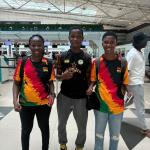The 2025 FIFA Club World Cup in the United States has become a vibrant showcase of global football culture, with African supporters creating some of the tournament's most memorable atmospheres.
For the first time in the competition's history, four African clubs; Al Ahly (Egypt), Mamelodi Sundowns (South Africa), Esperance Sportive de Tunis (Tunisia), and Wydad Casablanca (Morocco) are participating in the expanded 32-team format. Their passionate fan bases have traveled across continents, bringing color, energy, and distinctive football traditions to American stadiums.
When Egyptian giants Al Ahly faced Inter Miami in the tournament opener at Hard Rock Stadium, the venue witnessed what many described as a "true red wave." Despite predictions of poor attendance, the stadium filled with nearly 61,000 fans, with Al Ahly supporters matching or even outnumbering those supporting Lionel Messi’s Inter Miami.
The passionate Egyptian supporters transformed Miami with shirts, banners, and chants that echoed for miles, proving that their club’s greatness extends beyond trophies and into the hearts of its people.
South Africa’s Mamelodi Sundowns, known as "The Brazilians" for their yellow kit and attacking style, brought their vibrant "Yellow Nation" fan base to Orlando. Supporters landed in Florida ahead of their historic participation, quickly making themselves at home with swimming, drinks, and cooking as they prepared for their matches against Ulsan HD, Borussia Dortmund, and Fluminense.
The significance of Sundowns’ participation extends beyond the tournament itself. As the first South African team to compete in the FIFA Club World Cup, they carry the hopes of a nation and continent that has long been underrepresented in global club football. Backed by Patrice Motsepe, South African mining billionaire and President of the Confederation of African Football (CAF), the Pretoria-based club has dominated domestically but now seeks global recognition.
Their efforts were rewarded when striker Iqraam Rayners scored to secure Sundowns’ first-ever FIFA Club World Cup victory against South Korea’s Ulsan HD on June 17, 2025. This historic win marked not only a milestone for the club but also the first victory for an African side at the tournament in the United States.
Perhaps the most dramatic display of African fan passion came from Esperance Sportive de Tunis supporters, who traveled in remarkable numbers to Philadelphia for their match against Brazilian club Flamengo. The Tunisian club was backed by approximately 10,000 traveling supporters from Africa, showcasing the extraordinary commitment of their fan base.
The pre-match festivities were spectacular, with Esperance fans taking over Liberty Point in Philadelphia, setting off red and yellow flares that created a stunning visual display. Their presence was felt throughout the city, from Reading Terminal Market to Lincoln Financial Field, where they engaged in non-stop singing throughout the entire match against Flamengo.
The African presence at the Club World Cup has highlighted the global nature of football fandom and the power of cultural connections that transcend borders. FIFA reports that some 1.5 million tickets have been sold to fans from more than 130 countries for the tournament, with African supporters making up a significant portion of international attendees.
For many African diaspora members living in the United States, the tournament offers a rare opportunity to connect with their heritage and support teams from their home countries. The competition has transformed American cities into international hubs of soccer, with fans from different nations creating a festival-like atmosphere around matches.
Despite the enthusiasm of African supporters, the tournament has faced challenges. Some weekday matches have struggled with attendance, particularly those scheduled during working hours. A match featuring Mamelodi Sundowns against Ulsan HD in Orlando drew only 3,412 fans, according to official figures.
There have also been concerns about accessibility for international fans, with some criticizing high ticket prices and inconvenient match times. Others raised issues about stadium security measures, though no major incidents have been reported.
Despite these challenges, the expanded Club World Cup represents a significant opportunity for African clubs to gain global recognition and financial benefits. The total prize pot for the tournament stands at a staggering $1 billion, with $475 million based on performance. Success in the competition could secure a huge payday for participating African clubs, potentially transforming their futures.
As the tournament progresses toward its conclusion on July 13 , African fans continue to make their presence felt across America. Their passion, commitment, and cultural expressions have added immeasurable value to the competition, demonstrating that football truly is the world's game.
For the players and coaches representing Africa, the message from their supporters is clear, play with pride and show the world what African football is capable of achieving on the global stage.




